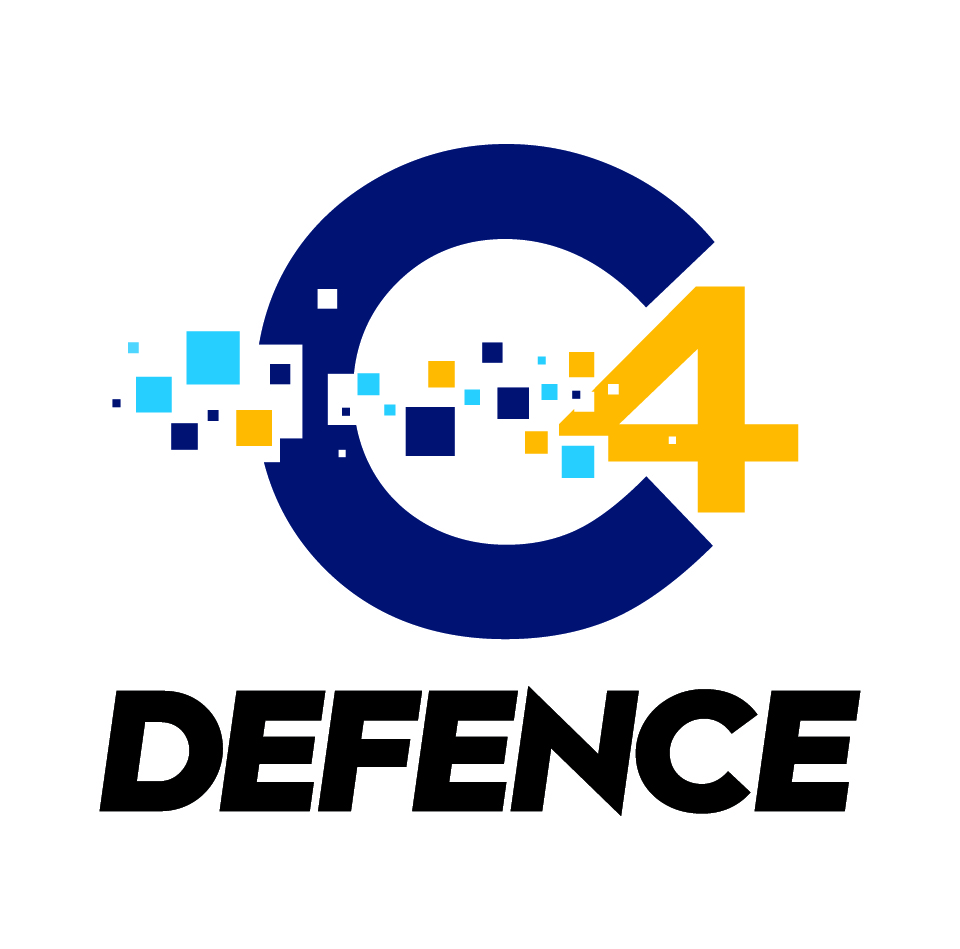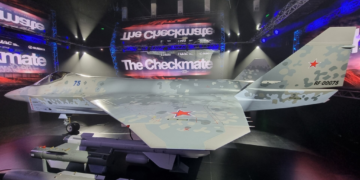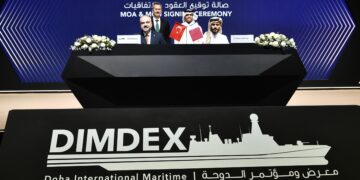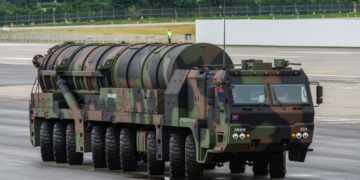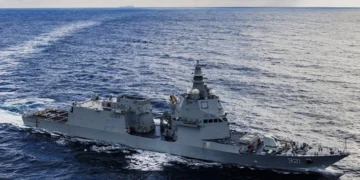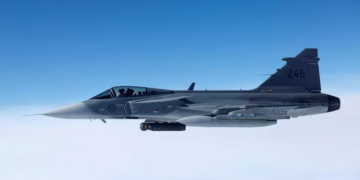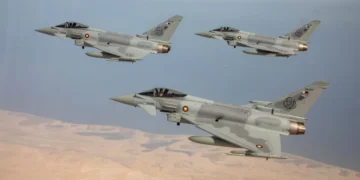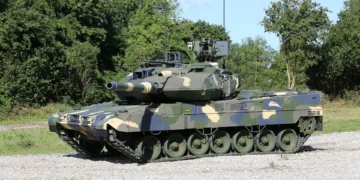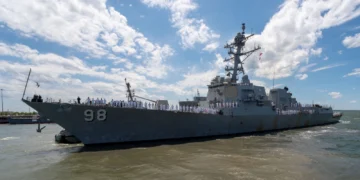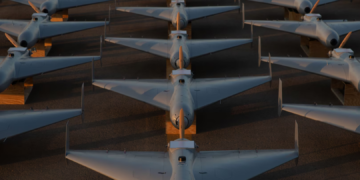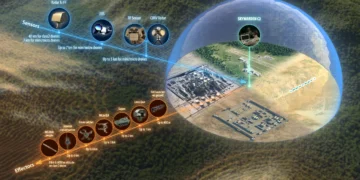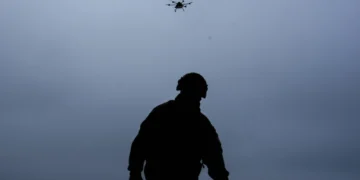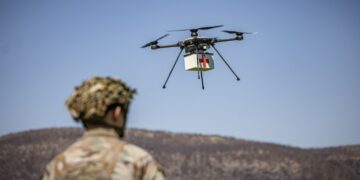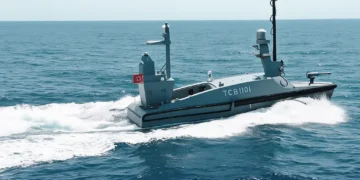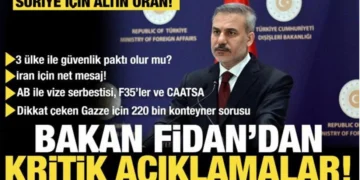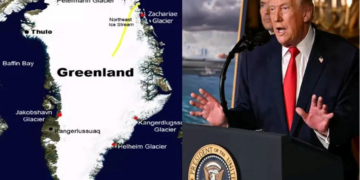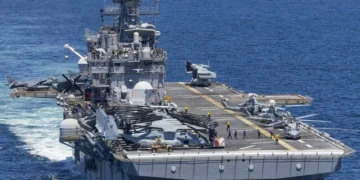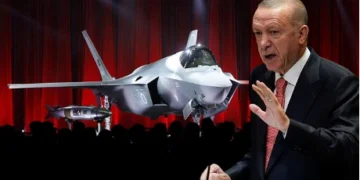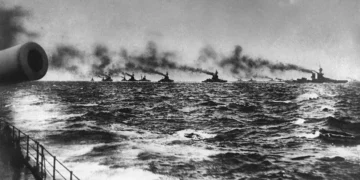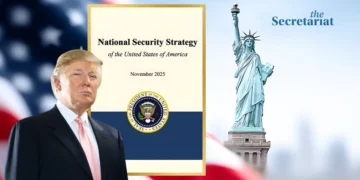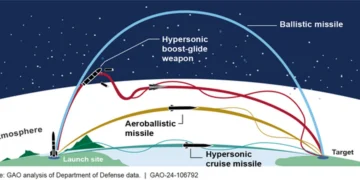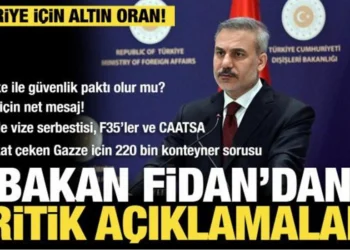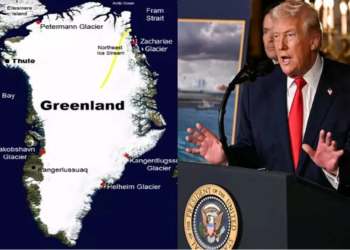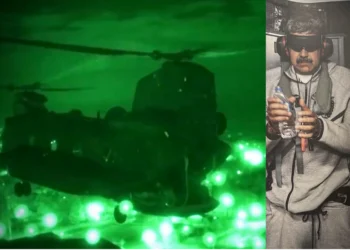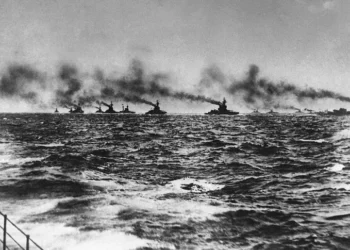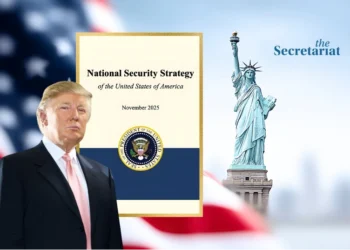“In the face of many geopolitical uncertainties, especially German-Turkish relations offer great potential. Because there are a large number of citizens of Turkish origin in Germany, because there is strong trust between both sides, and because Turkey is very close to Europe.”
— Christian Wulff, 10th President of Germany
The first six months of the new coalition government under the leadership of Chancellor Friedrich Merz are considered significant in terms of maintaining the balanced course of Turkish-German relations and implementing new cooperation plans in emerging areas.
In our opinion, the disruptions in Europe’s security parameters endangered by the Russia–Ukraine war, and the uncertainty surrounding ceasefire and peace negotiations despite the efforts of U.S. President Donald Trump at the Alaska Summit, have led Berlin to concerns that the war could expand.
As will be recalled, Germany’s Defense Minister Christine Lambrecht recently announced Germany’s goal of becoming Europe’s leading military power. Lambrecht stated that the Bundeswehr not only plays a role in guaranteeing Germany’s security but also contributes to the security of NATO allies. She reminded that Germany has been the country that benefited the most from the security architecture established during the Cold War, adding:
“And now we have to be the country that contributes the most militarily. Germany’s size, geographical position, and economic power—in short, its weight—assign us a leadership role. Whether we want it or not… This applies militarily as well.” Lambrecht underlined that German democracy is stable, its institutions are strong, and its political culture is peaceful rather than militaristic. The Defense Minister stated, “There is no reason for Germany to fear playing this role; Germany can accomplish it.”
Germany’s 10th President Christian Wulff emphasized in Düsseldorf that the current geopolitical situation favors utilizing opportunities between Turkey and Germany.2 He highlighted that more discussions should take place on what can be done together in areas such as digitalization, defense, armament, energy, and renewable energy. Drawing attention to citizens of Turkish origin living in Germany and the mutual trust between the two countries, Wulff stated: “In the face of many geopolitical uncertainties, especially German-Turkish relations offer great potential. Because there are a large number of citizens of Turkish origin in Germany, because there is strong trust between both sides, and because Turkey is very close to Europe.”
Wulff underlined that this means there are no supply chain problems with Turkey, adding: “Producers in Turkey deliver quality on time. They are very reliable in cooperation. This provides opportunities for Turkish companies to invest in Germany as well as for German companies.” Referring to the contribution of people of Turkish origin in Germany to the country’s economy, Wulff stated: “Citizens of Turkish origin in Germany have played a major role in the economic miracle and in making Germany an economic nation.” He added: “Because we trust each other, I see great opportunities here.” The former President of Germany called for people of Turkish origin to play a major role in intensifying relations with Turkey, emphasizing that almost every Turk has a family member who is in Germany or has lived there at some point.1 Wulff underlined that there are more connections between Germany and Turkey than between any other two countries, stating that these ties should be utilized in trade, economic relations, projects, and investments: “Because we trust each other, I see great opportunities here.”3 On September 9–10, 2025, nineteen unmanned aerial vehicles belonging to Russia entered Polish airspace via Belarus; at least three drones were shot down by Polish and NATO forces. The nature of the incident—whether it was a provocation or a reconnaissance operation—sparked debate. It was assessed that the UAVs followed planned routes and that Moscow aimed to test NATO’s reactions, integration, and operational procedures.4 Russian fighter jets and drones’ violations of airspace over the Baltic Sea were discussed at the most recent NATO meeting. NATO, warning Russia, declared that it would use “all necessary military or non-military means” to counter threats stemming from airspace violations. Meanwhile, despite the ceasefire agreement in the Gaza War, the Netanyahu government’s violations of the truce continue to pose a major cause of instability for Middle Eastern energy security and geopolitical fragility.5 So, where do the interests of Berlin and Ankara converge, and where do they diverge? On what pillars will bilateral relations rest? Germany expresses its intention to strengthen cooperation with Turkey. Friedrich Merz has previously emphasized Turkey’s geopolitical importance and advocated for the development of relations. His statement, “Turkey is an extremely valuable and important NATO partner for us, and I will do everything I can to maintain and further develop this partnership within the NATO framework,” reflects these dynamics.6 In this gray environment, Chancellor Merz’s first official visit to Ankara on October 30, 2025, can be interpreted as a sign of willingness to open a new “White Page” in relations between the two historical allies, Germany and Turkey.
Within this framework, Chancellor Friedrich Merz met with President Recep Tayyip Erdoğan during his visit to Ankara. Hosting Chancellor Merz, President Erdoğan stated: “Germany is Turkey’s largest trading partner in Europe. We aim to increase our trade volume, which has reached 50 billion dollars, to 60 billion in the near future.” Merz, in return, said: “Both I and the federal government want to see Turkey in the EU. I proposed a strategic dialogue on this matter.”
Geopolitically, Turkey has become one of the actors that Berlin values as a security partner—thanks to its facilitating and legally mediating role in resolving regional conflicts such as the Russia and Gaza wars, as well as its developing military capacity through advances in the defense industry.7 This has come to the forefront as the fundamental rationale for a new process between the two sides.
NATO Ally Germany – Turkey’s Move Toward a Deepened Strategic Partnership and New Opportunities
During his first visit to Ankara, the German Chancellor stated at a press conference with President Erdoğan that Turkey–European Union relations would enter a new phase, emphasizing that “we will launch a new strategic dialogue with Turkey.” The talks, held at a time when Russia is increasingly perceived as a major threat by Europe, were expected to focus on security and defense industry issues, as well as energy, migration, and trade. It was noted that the growing cooperation in areas such as trade and energy has created satisfaction, and that new opportunities in these fields would be evaluated during the Erdoğan–Merz meeting.8 The meeting aimed to strengthen the economic, military, and diplomatic cooperation between the two countries. Merz stated, “We want to see Turkey in the European Union,” emphasizing that compliance with the Copenhagen criteria was necessary, and proposed a “strategic dialogue” to Erdoğan. President Erdoğan responded to this proposal by saying, “We are not against the Copenhagen criteria, but we also have the Ankara criteria. Turkey is not just any Asian or European country,” stressing that if Turkey’s will for full membership is reciprocated, rapid progress could be achieved.9
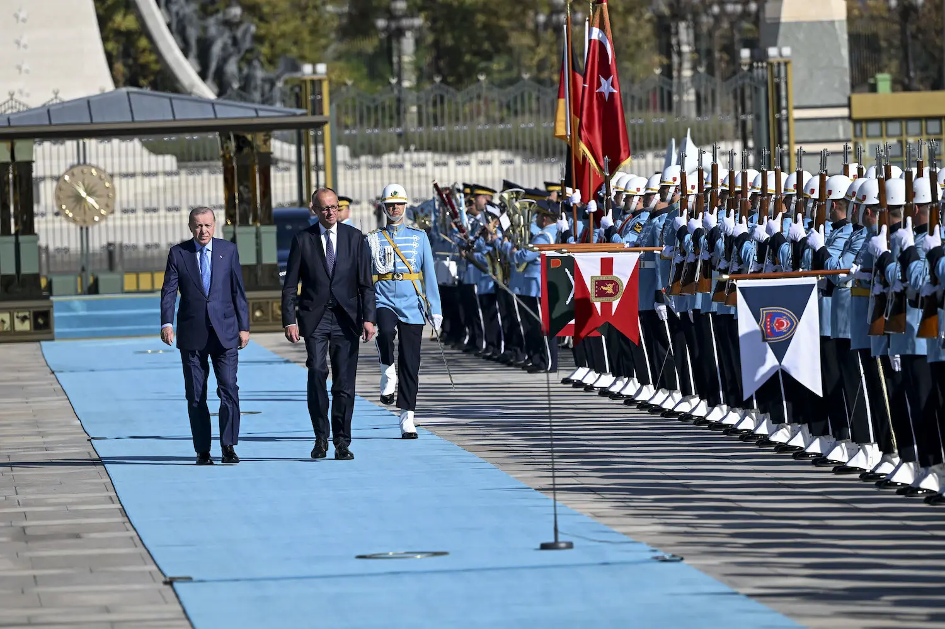
During Merz’s visit, Erdoğan and the Chancellor exchanged views on sensitive issues, particularly Turkey’s EU membership, the situation in Gaza, and migration policies. The two leaders met in an open and sincere atmosphere. Merz underlined that the two countries are economically, militarily, and culturally intertwined, and emphasized that this relationship should be deepened further in the future. 10 Like Turkey, Germany is also striving to adapt to the increasingly harsh rules of global politics and to redesign a solid, trust-based partnership founded on reciprocity to enhance its own power through economic and military cooperation. It is assumed that this shift will yield positive medium- and long-term results for Europe and regional peace.
One of the most surprising and significant messages of Chancellor Merz’s visit was his historic statement that Berlin supports Turkey’s EU accession process. Merz’s remark, “We see Turkey as a close partner of the EU,” and Erdoğan’s response, “We can make serious progress in full membership in a short time,” demonstrated that both sides possess the political will for a new era. In line with this observation, Merz laid a wreath at the mausoleum of Mustafa Kemal Atatürk, the founder of modern Turkey, writing in the Anıtkabir memorial book: “His ideas continue to influence the deep friendship between the Federal Republic of Germany and the Republic of Turkey today.” The Chancellor assured Erdoğan of Germany’s support for Turkey’s EU membership goal, stating: “Personally, I and the German government see Turkey close to the European Union. We want to continue opening the path toward Europe.”11
Merz also referred to the Copenhagen criteria for EU accession, declaring: “The path to the EU passes through compliance with the Copenhagen criteria. Certain decisions taken in Turkey have not yet met these criteria.”12 He further expressed: “I conveyed my concerns that judicial standards have not yet reached the level we desire within the EU. However, that is the very subject of these talks.”13
At the joint press conference in Ankara, Merz said that he viewed Turkey as a “close partner” to the EU and that, in the new period, they aimed to “pave the road toward Europe” in many areas, including bilateral economic relations. One of the concrete topics he emphasized was transportation and logistics. Described as “the Prime Minister’s first official visit,” this framework suggests Berlin’s intention to establish an institutional and lasting “strategic dialogue” with Ankara. On the Turkish side, Erdoğan reiterated the emphasis on “Ankara criteria” within the EU file, voicing an expectation for a politically accelerated process. This discourse indicates that the negotiation will continue between technical criteria and political will — Berlin’s reminder of the “Copenhagen criteria” and Ankara’s “if there is political will, the process accelerates” stance meet at the same table. During this visit, it was reiterated that Erdoğan’s meetings with the German Chancellor would address not only the development of economic, energy, and defense ties between the two countries but also the ongoing war Russia wages in Ukraine, the frictions in the Middle East, and other international developments.
Erdoğan stated that during their talks, they discussed bilateral relations and international issues on the basis of common interests as two close NATO allies. He said: “We also expressed our expectations from them regarding our full membership in the European Union, which we see as a strategic goal. If Turkey’s determined stance on this matter receives the recognition it deserves from the Union, we can make substantial progress in a very short time. Looking at developments in our region and the world, I believe the strategic importance of Turkey–EU relations will be better understood.”
Erdoğan reiterated: “We expressed our expectations from them regarding our full membership in the European Union, which we see as a strategic goal. If Turkey’s determined stance on this matter receives the recognition it deserves from the Union, we can make substantial progress in a very short time. Looking at developments in our region and the world, I believe the strategic importance of Turkey–EU relations will be better understood.”
He also noted that today marks the 64th anniversary of the Labor Agreement signed between West Germany and Turkey, recalling that exactly 64 years ago, those who went to Germany with their suitcases in hand and homesickness in their hearts have, with their now 3.5-million-strong community, made great contributions to Germany’s development in all fields.14
A View of Ankara from the Berlin Window
During Chancellor Merz’s visit, the German press—despite some differing opinions—largely reflected the view that, when approached realistically, Germany needs Turkey, and that Merz’s step was the right strategic choice. Erdoğan has played a major role over Hamas in Gaza, and his influence on Putin is undeniable. This makes Turkey an important partner, and it is observed that this visit is regarded as a sign of a new era between Germany and Turkey.
The “Turkey file” that Prime Minister Friedrich Merz inherited from Social Democrat Olaf Scholz contains many complex and unresolved issues at both the bilateral and international levels. In this new period, Merz will have to make difficult choices between the values he advocates and strategic interests. As with his predecessor Scholz, it is stated that although Merz is uncomfortable with Erdoğan’s political steps, he will attempt to build cooperation based on “pragmatism and necessity.”15
In this context, according to the German press, the joint press conference held after the visit clearly revealed the political differences between Germany and Turkey. Especially regarding the conflict in Gaza and the role of Hamas, there were sharp disagreements between Erdoğan and Merz. At the end of the press conference, Erdoğan made a remarkable move by stating that he did not agree with Merz’s remarks.
From Germany’s perspective, Turkey is a critical partner on NATO’s southeastern flank. Merz’s visit to Ankara was designed to understand Erdoğan, to explore his goals and motivations, and to take confidence-building steps rather than seek a quick “deal.” One of the key issues at the press conference was Turkey’s plan for European Union membership. Erdoğan emphasized Turkey’s determination to join the EU and stated: “If the EU approaches Turkey based on the Copenhagen Criteria, we have our own Ankara Criteria in return. With the Ankara Criteria, we open ourselves to Europe and the world. Because Turkey is not an ordinary European or Asian country.”
Merz refrained from commenting on most of Erdoğan’s claims and did not delve deeply into the topic. His purpose in going to Ankara was quite clear: the visit was meant to take place among friends and to open a new, harmonious page in Germany–Turkey relations. Therefore, Merz preferred to remain as much in the background as possible.
Under Merz’s leadership, Germany aims to approach Turkey not from a critical stance but on a friendly basis, seeking to strengthen relations. Both Ankara and Berlin have expressed determination to enhance cooperation. During his visit to Ankara, Chancellor Merz emphasized the economic, military, and cultural ties between the two countries and declared their intention to deepen these in the future. Merz was right to restart strategic dialogues and expand communication channels with Ankara. With this step, he acknowledged Turkey’s growing importance in the current global context.
It is of great importance to benefit from Erdoğan’s influence over Hamas in Gaza and over Putin. Moreover, if the German government plans to implement its statement about returning Syrians to their home country, close relations with Ankara will be beneficial in this regard as well. Therefore, closer cooperation with Turkey is inevitable.16
As explained above, from Germany’s perspective, politicians in Berlin—who until recently devoted their resources to developing trade, believed it was sufficient to rely on the United States militarily, and assumed that as long as they had U.S. support there would be no serious threat to them—seem to have awakened from a bad dream. Russia’s invasion of Ukraine and U.S. President Donald Trump’s unreliable attitudes woke them up, but since their slumber lasted too long, they are now acting in panic, having fallen far behind militarily. They have rapidly allocated large resources to rearmament, want to reintroduce compulsory military service to increase troop numbers, and are trying to regain allies they had alienated in their neighborhood.
At the top of the list of countries they have alienated—by imposing a de facto arms embargo, opposing EU membership, and intervening in internal affairs under the pretext of democracy and human rights issues—is Turkey.17
A New Era in Defense and Security Cooperation: Turkey Cannot Be Left Out of This Process
German Chancellor Friedrich Merz’s visit to Turkey is highly significant not only for bilateral relations between the two countries but also for the resolution of regional issues. For European countries seeking to increase their influence in resolving problems in Europe and nearby regions and to reduce their dependence on Washington, Turkey has become an increasingly important partner. Merz’s visit took place only a few days after the Eurofighter Typhoon fighter jet agreement was signed between Turkey and the United Kingdom. As is known, Germany, along with the United Kingdom, Italy, and Spain, is a member of the consortium that developed these fighter jets. Approval from all partners is required for the sale of these aircraft to a third party. Despite certain reservations within Germany’s domestic politics regarding the acquisition of Eurofighter jets, it can be said that practical cooperation is possible. Eliminating procurement bottlenecks, establishing a joint production and maintenance-sustainment ecosystem, and similar subtopics could serve as confidence-building measures in the medium term. In this sense, Merz’s visit coincides with a period when defense cooperation between Ankara and Berlin has regained momentum.
As will be recalled, German Foreign Minister Johann Wadephul’s visit to Ankara on October 17 was the forerunner of this process, during which Wadephul stated, “Turkey is a reliable and central NATO partner for us.” Wadephul also described Turkey as a “strategic partner.” President Erdoğan, emphasizing the need to focus on joint projects in the field of defense, said: “In light of changing security conditions in Europe, we must move beyond the difficulties we have experienced in the supply of defense industry products and focus on joint projects.” 18 Erdoğan’s statement, “In light of changing security conditions in Europe, we must leave behind past difficulties in the procurement of defense industry products and focus on joint projects,” confirms the accuracy of the observations made in this short article.
Indeed, President Erdoğan, referring to the Eurofighter and defense industry cooperation as well as Germany’s recent positive steps in this area, emphasized that Turkey welcomes these developments with satisfaction. Considering the momentum Turkey has achieved in its defense industry, Erdoğan noted that there are wide-ranging opportunities for cooperation with Germany. He stated that this cooperation could be further strengthened on the basis of a win-win approach. In fact, Erdoğan’s remarks regarding Turkey’s procurement of Eurofighter fighter jets— “We welcome with satisfaction the positive steps Germany has recently taken in this area, such as the Eurofighter acquisition process”—support this assessment.19
In this context, taking into account the warning in the German press that “the world is entering a new geopolitical era shaped by great powers, and Turkey is one of these powers; at the same time, it is a NATO partner and a key actor for the EU in almost all foreign and security policies,” it is assumed that, in the medium and long term, the historical partnership between the two countries could create new opportunities for strategic cooperation.20 Within the framework of NATO, subtopics such as interoperability, air power modernization, electronic warfare, air-to-air munitions, and supply chain security stand out. The balance that Ankara will establish between its domestic defense projects (e.g., KAAN) and Western-origin platforms will serve as both a political and technical testing ground. Under the axes of green and digital transformation, joint projects could come to the fore in railways/logistics, automotive sub-industries (especially the electric vehicle ecosystem), machinery-chemistry, and software-IT services.
Turkey’s exports to Germany reached $20.4 billion in 2024, while Germany’s exports to Turkey stood at $30.9 billion. Mutual investments, supply security, and standardization alignment (e.g., CBAM, data protection, cybersecurity) will form the technical backbone of the economic dialogue. Berlin’s new defense and foreign policy approach can be regarded as a concrete reflection of the traditionally defined Realpolitik principle; Realpolitik can be described as a strategy that prioritizes national interests and emphasizes pragmatism and balance of power over ideological concerns.21
In conclusion, Merz gave the green light to the sale, stating that Eurofighter aircraft are “important for the security of all of us.” The German Chancellor emphasized Turkey’s importance by saying, “The world is entering a new geopolitical process. As Germans and Europeans, we must develop our strategic partnerships. Turkey cannot and should not be left out of this process.”
References
[1] https://www.setav.org/federal-hukumetin-ilk-alti-ayi-ve-sansolye-merzin-turkiye-ziyareti-ikili-iliskilerde-yeni-ivme
2 https://hurseda.net/dunya/243177-almanya-hedefini-acikladi-avrupa-nin-askeri-gucu-olmak.html
3https://www.dirilispostasi.com/amp/eski-almanya-cumhurbaskani-wulff-alman-turk-iliskileri-buyuk-potansiyeller-sunuyor
4 https://kriterdergi.com/dis-politika/dogu-avrupada-test-edilen-caydiricilik-nato-hava-sahasina-yonelik-rus-iha-saldirilari
5 https://www.dw.com/tr/natodan-rusyaya-ihlal-uyar%C4%B1s%C4%B1/a-74110838
6 https://fikirturu.com/jeo-politika/turkiye-almanya-iliskilerinde-yeni/
7 https://www.cnbce.com/gundem/ankarayi-ziyaret-eden-almanya-basbakani-merz-turkiyeyi-abde-gormek-istiyoruz-h19020
8 https://www.bbc.com/turkce/articles/c803gr85plko
9 https://www.bbc.com/turkce/articles/c803gr85plko
10https://www.ahaber.com.tr/gundem/2025/10/31/almanya-basbakani-friedrich-merzin-turkiye-ziyareti-alman-basininda?paging=2
11]https://tr.euronews.com/my-europe/2025/10/30/merzin-ankara-ziyareti-israil-konusunda-erdoganla-gorus-ayriliklari
12 https://politikaakademisi.org/2025/10/31/basbakan-merzin-ankara-ziyareti-turkiye-ile-stratejik-diyalog-arayisi/
13https://www.hurriyet.com.tr/gundem/almanya-basbakani-merz-ankarada-cumhurbaskani-erdogan-resmi-torenle-karsiladi-43002140
14https://www.borsaningundemi.com/haber/almanya-basbakani-merz-ankarada-turkiye-ile-baglari-guclendirecegiz-1871214
15https://www.dw.com/tr/almanya-t%C3%BCrkiye-ili%C5%9Fkilerinde-friedrich-merz-d%C3%B6nemi/a-72454451
16https://gazeteoksijen.com/dunya/alman-medyasi-erdogan-merz-gorusmesini-yazdi-simdi-dost-mu-olduk-255544
17 https://www.aa.com.tr/tr/analiz/turk-alman-iliskilerinde-stratejik-ortaklik-yeniden-mi-basliyor/3730433
18https://medyascope.tv/2025/10/30/almanya-basbakani-friedrich-merz-erdogan-ile-gorustu-imamoglu-sorusu-yanitsiz-kaldi/
19 https://www.ekonomim.com/gundem/cumhurbaskani-erdogan-ve-almanya-basbakani-merzden-onemli-aciklamalar-haberi-852072
20https://www.milliyet.com.tr/dunya/son-dakika-yunan-basini-almanya-sansolyesi-merzin-turkiye-ziyaretindeki-asil-tehlikeyi-yazdi-ankara-bir-adim-daha-yaklasti-7474391
21 https://politikaakademisi.org/2025/10/31/basbakan-merzin-ankara-ziyareti-turkiye-ile-stratejik-diyalog-arayisi/

